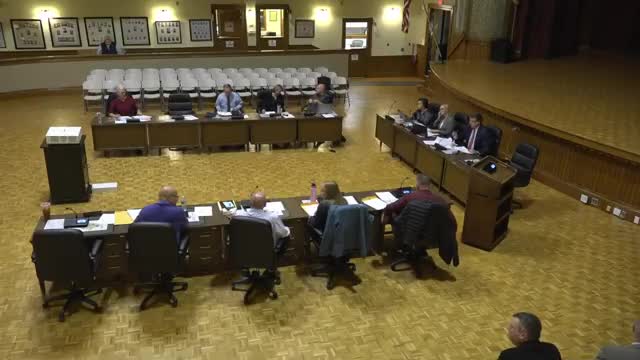Peabody committee adopts ordinance banning on-site bitcoin kiosks, orders removal within seven days
Get AI-powered insights, summaries, and transcripts
Subscribe
Summary
The Peabody City Legal Affairs Committee voted 5-0 to adopt an ordinance outlawing “virtual currency kiosks” in the city, requiring existing machines to be removed within seven days and authorizing police enforcement and daily fines.
The Peabody City Legal Affairs Committee voted unanimously to adopt an ordinance that prohibits “virtual currency kiosks” — self-service machines that exchange cash for cryptocurrencies — and requires any existing machines in the city to be removed within seven days of the ordinance's effective date.
District Attorney Paul Tucker told the committee the machines have become a preferred payment channel for scammers and urged local action. "The Federal Trade Commission has called it a payment portal for scams," Tucker said, adding that once money is fed into a Bitcoin machine "chances of getting it back, probably about 1 or 2%."
The ordinance mirrors language used by other North Shore municipalities and would make it unlawful to host, allow, operate or locate a virtual currency kiosk within Peabody. The ordinance text read into the record makes the Peabody Police Department responsible for enforcement and sets a noncriminal fine of $300 per violation per day, with each day of continued operation treated as a separate offense.
Why it matters: Prosecutors and police described frequent, rapid losses by vulnerable residents who are targeted by impostor scams. "We believe it's about 15 victims since 2023. A total of $147,000 has been lost by these victims," Sergeant Dave Bettencourt said, summarizing the department's local casework. District Attorney Tucker said reported losses in Essex County this year are about $11,000,000 and that number likely understates total losses because many victims do not report scams.
Committee members and law enforcement described the mechanics officers see: victims coached by callers to go to banks or stores and feed cash repeatedly into kiosks, often while still on the phone with the scammer. Police Chief Tom Griffin said Peabody's large elderly population is particularly at risk and that companies operating kiosks have been increasingly uncooperative with investigations.
Members pressed practical questions about enforcement and placement. Officers said kiosks typically appear under a commercial contract between a store owner and a kiosk operator (the department frequently identified Bitcoin Depot in testimony), and that those contracts sometimes discourage store staff from cooperating with police. Sergeant Bettencourt also said kiosks look like conventional ATMs and may carry only small, hard-to-notice warnings for consumers.
Committee discussion also referenced outside precedents: Gloucester recently adopted similar language, Waltham and other communities have considered ordinances, and a bill under consideration in the state legislature could create a statewide framework but may take months to resolve. Several councilors said a local ban is a stopgap to protect residents while broader state action proceeds.
The motion to adopt the ordinance was made by Councilor Turco and carried in a roll-call vote of 5-0 (Turco, Peach, Higgins, Melville and Chair Tom Rosenga voting yes). The ordinance text as read requires removal of all virtual currency kiosks within seven days of the ordinance becoming effective, assigns enforcement to the police department, and provides the municipal penalty structure described above.
The committee also asked police to provide the list of kiosk locations in the city to councilors; Sergeant Bettencourt and Chief Griffin said they have compiled such a list and can share it with the council. Councilors and officials said they will pursue outreach, including public-service announcements and cooperation with the North Shore Chamber of Commerce and the Council on Aging to warn residents.
The meeting ended after the unanimous vote; no additional items were considered.
